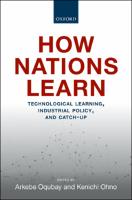How Nations Learn
Technological Learning, Industrial Policy, and Catch-up
Contributor(s)
Oqubay, Arkebe (editor)
Ohno, Kenichi (editor)
Language
EnglishAbstract
Authored by eminent scholars, the volume aims to generate interest and debate among policymakers, practitioners, and researchers on the complexity of learning and catch-up, particularly for twenty-first century late-late developers. The volume explores technological learning at the firm level, policy learning by the state, and the cumulative and multifaceted nature of the learning process, which encompasses learning by doing, by experiment, emulation, innovation, and leapfrogging. Why is catch-up rare? And why have some nations succeeded while others failed? What are the prospects for successful learning and catch-up in the twenty-first century? These are pertinent questions that require further research and in-depth analysis. The World Bank estimates that out of the 101 middle-income economies in 1960, only thirteen became high income by 2008. This volume examines how nations learn by reviewing key structural and contingent factors that contribute to dynamic learning and catch-up. Rejecting both the one-size-fits-all approach and the agnosticism that all nations are unique and different, the volume uses historical as well as firm-level, industry-level, and country-level evidence and experiences to identify the sources and drivers of successful learning and catch-up and the lessons for late-latecomer countries. Building on the latecomer-advantage perspective, the volume shows that what is critical for dynamic learning and catch-up is not learning per se but the intensity of learning, robust industrial policies, and the pace and direction of learning. Equally important are the passion to learn, long-term strategic vision, and understanding the context in which successful learning occurs.
Keywords
catch-up; technological learning; industrial policy; latecomers; intensity of learning; policy learning; emualation; innovationDOI
10.1093/oso/9780198841760.001.0001Publisher
Oxford University PressPublisher website
https://global.oup.com/Publication date and place
Oxford, 2019Classification
Economics
Economic growth
Development economics and emerging economies
Political economy
Industry and industrial studies


 Download
Download Web Shop
Web Shop